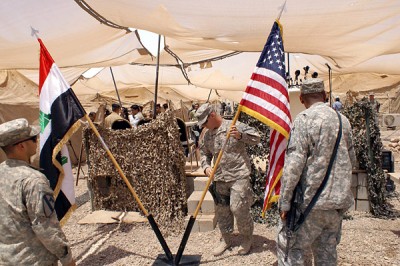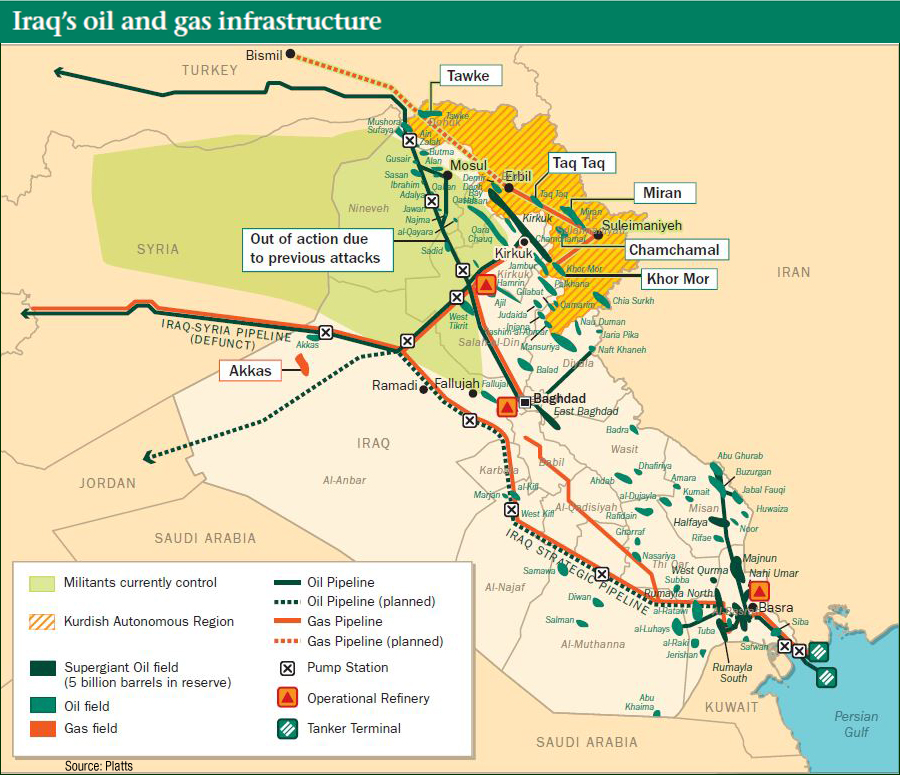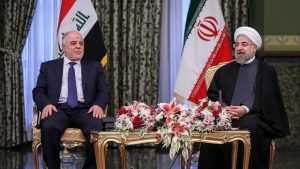Washington’s “Divide and Rule Strategy” in Basra, Home of Iraq’s Biggest Oil Fields

Note to readers: please click the share buttons above. Forward this article to your email lists. Crosspost on your blog site, internet forums. etc.
Basra is supposed to be a prosperous province for its citizens. The province is a home for most of Iraq’s biggest oil fields. Overall, Iraq is a country with the 4th largest oil reserve in the world. All the country’s six ports, transporting oil and other goods, are located in Basra. The petrochemical industry is also growing rapidly. Basra was also blessed with fertile soil so it once became a food barn for the country.
But Basra residents’ life not even as bright as the night lights of the city. Since 2014, residents of various cities have fled to Basra to escape from ISIS. The population has increased dramatically and the existing infrastructure is no longer adequate. Unemployment is increasing rapidly because new citizens do not have sufficient skills, while foreign companies prefer to employ skilled labor from Pakistan, India, Bangladesh or Indonesia.
In July 2018, hundreds of people in Basra rallied against Prime Minister Haider Abadi’s administration over the various economic problems they faced, especially the lack of electricity and health water, and unemployment.
Actually, these problems are faced by the people in southern Iraq years ago but have never been resolved. Since the reign of Saddam Hussein, the southern Iraq region with a majority Shiite population has been ignored.
Dr. Dina Y. Sulaeman (image right)
In 2003, US and its allies invaded Iraq to topple President Saddam Hussein. Since then, until 2013, the US occupied Iraq and forced a sectarian system of government for its interest. According toIraqi novelist in New York Times, Sinan Antoon:
L. Paul Bremer III, the head of the Coalition Provisional Authority, announced the formation of the so-called Governing Council in July 2003. The names of its members were each followed by their sect and ethnicity. Many of the Iraqis we spoke to on that day were upset with institutionalization of an ethno-sectarian quota system. Ethnic and sectarian tensions already existed, but their translation into political currency was toxic. [1]
There is one main fact to consider: Basra is a Shiite-dominated region. The riot in Basra which began in June and escalated on 7th September with the burning of the Iranian consulate building is interesting to analyze since its majority of population are Shiite, and the Prime Minister is a senior member of Iraq’s ruling Shiite political class.
This fact seems to contradict the observations of some analysts who wrote that the latest developments in Basra reflects the refusal of Basra citizens to Iranian intervention and/or their rejection of a pro-Iranian government. Many articles, both mainstream media and anti-mainstream demonized Iran as the cause of electricity shortages in Iraq while neglecting to acknowledge the important role of the US in this conflict. This article tries to provide a more comprehensive review on the riots in Basra.
Iran-Iraq Relations in Idealism Perspective
Most of Middle Eastern observers analyze the conflicts in the region with a realistic perspective: it is all about power struggles. They argue that Iran’s involvement in Iraq is to control the Baghdad regime; or to contain Saudi Arabia’s power in the region; or to fight US hegemony. The religious factor is often used as an argument: the alleged Shiite-theocracy regime wants to expand its influence and power in the region; or, the Shiite-country wants to fight the Sunni-Saudi.
Strangely, if religion is taken as an important assumption in the analysis, why is it that the opposite assumption is not taken into consideration: it is the religious factor that keeps Iran helping Iraq in the midst of its economic difficulties? Why is this positive-idealism factor often ignored in the analysis about Iran?
In the perspective of idealism, countries are assumed as actors which tend to work together because in this way they achieve their national interests. Using this idealistic perspective, Iran’s moves in the Middle East, particulary Iraq, would be seen very different perspective in contrast to the images of so-called realist observers.
Iran is a theocratic state which blatantly states that the foundation of its country is the Islamic 12 Imam-Shiite school. Most Iranians are very respectful towards the Prophet Muhammad and his descendants, and this respect also becomes the basis of foreign policy. In this perspective, Iraq is a spiritually-valuable neighbor for Iran. Many tombs of Shiite-sacred Imams are located in Iraq and every year, 2-3 million Iranian pilgrims come to Iraq to visit those tombs. For that spiritual reason too, following the fall of Saddam Hussein, Iran assisted its neighbor to build infrastructure of electricity, clean water, roads, and airports, in the southern regions of Iraq, especially on the paths of pilgrims from Iran to Iraq, such as Najaf, Basra, and Karbala.
Iran also benefits from the development of the abandoned southern cities of Iraq. Usually, the Shiite pilgrims from many countries visit Iran as well. Travel agents offer Iraqi-Iraqi pilgrimage packages because some sacred tombs of Shiite prominent figures can also be found in Iran.
And naturally, the increase of tourism in both countries contributes to increasing trade between the two nations.
Now Iran is the third largest exporter to Iraq, after Turkey and China. Iraqis bought Iranian goods at cheaper price than goods from other countries but still the total value reached 6.6 billion USD in one year (2017) [3]. In the past, Iraq and Iran were two nations that fought each other for eight years [largely engineered by Washington] and now, thanks to this spiritual pilgrimage and trade, both countries have become friends.
In the perspective of idealism, this is the ideal relationship between countries: economic cooperation and peace. This is what idealistic thinkers such as Alfred Zimmern dreamed about.
But this good human tendency is always suppressed by the greed of some parties. There are always superpowers who are interested in waging war because in this way their industrial machines continue to work and make money.
The doctrine of realism provides a justification for “struggle for power” or “survival for the fittest” which equal to enmity and war.
The realist doctrines frame cooperation between Iran and Iraq as endangering stability. For example, as written by Katzman, a specialist in Middle Eastern Affairs:
“Iran has sought to achieve its goals in Iraq through several strategies: supporting pro-Iranian factions and armed militias; attempting to influence Iraqi political leaders and faction leaders; and building economic ties throughout Iraq. It is Iran’s support for armed Shiite factions that most concerns U.S. officials. That Iranian activity continues to a threat to stability in Iraq, according to senior U.S. commanders, and positions Iran to pursue its interests in Iraq after U.S. forces leave Iraq by the end of 2011.” [4]
If economic and security cooperation are a ‘threat to stability in Iraq’, what about the US embargo towards Iraq in the 1990s which resulted in more than a million deaths, many of them children?
What about the 2003 US invasion of Iraq?
The invasion and occupation has destroyed Iraq’s infrastructure, disrupted its social order while triggering sectarian warfare and the birth of ISIS. As a result of the US led war on Iraq, water and land in Iraq are contaminated as a result of depleted uranium ammunition. The radioactive fallout has caused cancer, leukemia and congenital birth anomalies. As stated by Scott Ritter, the former UN weapons inspector,
“The irony is we invaded Iraq in 2003 to destroy its non-existent WMD [weapons of mass destruction]. To do it, we fired these new weapons, causing radioactive casualties.”[5]
If we use the idealism perspective, voices from Iraq and Iran that continue to articulate unity between the two brothers will be seen as good thing. It makes sense particularly in view of the pressure of the Trump administration towards the Iraqi government to establish an embargo against Iran. As stated by the ruling party, Dawa:
“The party calls on all free governments in the world, especially the Islamic ones, to reject these unjust sanctions which contradict the most basic principles of human rights that prohibit the starvation of people.”
Of course, it is not only about the principles of human rights. Iraqi rejection to join the US in embargoing Iran is also related to the country’s interest.
“The 2 [million] or 3 million Iranian pilgrims who come each year represent a major economic activity that Iraq could now be deprived of,” said an economic adviser to PM Abadi, Muzhar Mohammed Salah. [6]
However, why is this reasonable call framed as a “hard-line-pro-Shia” stance rather than as a reasonable refusal against injustice? Why a superpower can arbitrarily embargo some countries and force other countries to join in the restriction, even if it is detrimental to the country’s interest?
Resistance to US Hegemony
Generally, anti-mainstream media have voiced resistance towards US hegemony and crimes in the Middle East. However, in the recent Basra issue, some observers still treat Iran as the same power hungry actor as the US. In one article of Global Research, it is written:
“…Several observers seem to confirm this. They point out that Iran is responsible not only for reducing electricity and water in the south, but also for inciting the inhabitants of Basra to revolt against the oil companies that recruit too few Iraqi workers.”[7]
But strangely, in the same article, the writer admit that,
“Many Iraqis regularly experience power outages – households only get a few hours of electricity a day – despite the fact that billions of dollars have been spent since the US invasion in 2003. Because of mismanagement, corruption and wasting 40 billion dollar to rebuild the electricity grid, Iraq is to date still unable to be self-sufficient.”
So, is it Iran’s fault, or the incapacity of the Iraqi government?
In July 2018, Iraq’s total electricity debt to Iran has reached 2 billion USD. Nowadays, Iran’s economy is not in a good state with its Riyal hit a record low against the U.S. dollar.
The article also stated that the Saudis have offered electricity for only a quarter of Iran’s price. While the price is doubtful because solar power technology is more expensive than the conventional one, the offer seems strange and this is recognized by the author:
Saudi Arabia agreed to build a solar power plant and sell the electricity to Iraq at a steep discount to supplies the war-torn country previously bought from the kingdom’s regional arch-rival Iran. The deal, which hasn’t been approved yet by Iraqi authorities, includes building a 3,000-megawatt plant in Saudi Arabia within a year of the signing of the agreement, Iraq’s Ministry of Electricity spokesman Mussab Serri said by phone. Iraq will buy the electricity for $21 per megawatt-hour, or a quarter of what it paid Iran for the imports, Serri said.
The question arises: why does Iraq not build a solar power plant in its own country? [8]
By using common sense, we can immediately see that the Saudis offer is nothing but nonsense. If it is true that the Saudis have a very cheap electricity, PM Abadi will not wait long to approve it.
Abadi’s willingness to negotiate with the Saudis on electricity shows that it is far-fetched to assume that his consideration in buying electricity is a matter of Shiite-ideology or ‘a loyalty to Iran’. It is worth noting, it was not the first time that Iran cut off the electricity supply to Iraq due to the payment debt.
So Abadi’s decision is logic: it is better to pay the debt and as a result, in August 2018, Iran opens its electricity supply to Iraq.
The question that should be asked: why is it that after the Iranian-electricity problem was solved, the demonstration of September 7 occured and the Iranian embassy was burned?
Of course, many Iraqi difficulties have yet to be resolved, but why -as Adriaensens wrote, the demonstrators were angry with Iran suggesting that “Shiites have to choose between Iraqi nationalism and loyalty to Iran”? [9]
Is not it like a misplaced puzzle?
Should the Shiites in the south not thank Iran instead of being angry? Who is really angry with Iran? I am sure that most of anti-mainstream thinkers know the answer: it is in the US interest to generate anti-Iran sentiment.
The US’ Interest
As mentioned earlier, the decree of Paul Bremer in July 2003 has triggered sectarianism in Iraq society.
In May 2003, another decree of Bremer dissolved the Iraqi army and this move incited the birth of ISIS. Christoph Reuter of Spiegel wrote about how Haj Bakr, an ex-Iraqi soldier, formed ISIS:
But when Paul Bremer, then head of the US occupational authority in Baghdad, “dissolved the army by decree in May 2003, he [Haj Bakr] was bitter and unemployed.”
Thousands of well-trained Sunni officers were robbed of their livelihood with the stroke of a pen. In doing so, America created its most bitter and intelligent enemies. Bakr went underground and met Abu Musab al-Zarqawi in Anbar Province in western Iraq. [10]
The US crimes in Iraq did not end there. The research of CAR (Conflict Armament Research) found that:
“In one instance, PG-9 73 mm rockets, sold by Romanian arms manufacturers to the U.S. army in 2013 and 2014, were found sprinkled across both battlefields. Containers with matching lot numbers were found in eastern Syria and recovered from an Islamic State convoy in the Iraqi city of Fallujah.”
“On Dec. 12, 2015, Bulgaria exported anti-tank missile launcher tubes to the U.S. army through an Indiana-based company called Kiesler Police Supply. Fifty-nine days later, Iraqi federal police captured the remains of one such weapon after a battle in Ramadi, Iraq.”
“Videos and images of U.S.-made small arms captured by the Islamic State, particularly M16 and M4 service rifles, are featured prominently in propaganda videos to tout defeat over groups supplied and trained by U.S. personnel.” [11]
And, in October 2016, As with Iraqi military begin a nine-month operation to free Mosul from ISIS’ grip. The Intercept wrote how this operation has done a huge devastation:
The nine-month battle to wrest the city from the Islamic State occupation, led by U.S.-backed Iraqi forces, killed thousands of civilians. It extinguished entire families in seconds. Across Iraq, it displaced millions to refugee camps, many of them from Mosul. It erased years of the city’s history, its dignified 18th-century facades, and the beating heart of the city where both trade and tourism had thrived. It did more damage to Mosul in those nine months than had occurred in the previous 14 years.
Mosul residents are left asking: Who will pay for the reconstruction? [12]
Prof. James Petras in articled published in Global Research (2014) wrote,
“No peaceful economic activity can match the immense profits enjoyed by the military-industrial complex in war. This powerful lobby continues to press for new wars to sustain the Pentagon’s huge budget. …War profits have soared with the series of military interventions in the Middle East, Africa and South Asia.” [13]
Now, fifteen years since the US invaded Iraq using the WMD pretext, some US politicians keep saying that America’s Iraq mission is not over. Senator Ernst says,
“Unless we are confident in Iraq’s capacity and ability to defend themselves, U.S. presence in Iraq will remain necessary to protect our interests.”
So, it is all about US interest. What about the Iraqi interest?
As I mentioned earlier, the tendency of countries to cooperate peacefully is always plagued by people who take advantage of war and the profits from war.
Then the question remains: how do we believe that Iran has an idealistic perspective in its engagement in Iraq? How do we make sure that it wants to establish cooperation for the mutual interests of the two nations?
One way to address and answer this question is by analyzing the speech of Iranian elites and prominent media. If we observe the comments in online media, what prevails is an atmosphere which suggests that Iranians are angry with their Iraqi neighbors. They called for the government to no longer help Iraq. For the Iranian people, it turns out that Iraq is quite a viper in their bosom.
Interestingly, Iranian officials refrain from criticizing the Iraqi government and repeatedly state that the riot in Basra is a US plot.
Iran’s media actively remind the public that “the aim of the enemies is to create discord between Iranian and Iraqis civil societies”. Kayhan, the most prominent newspaper in Iran, published an article (Parsi) entitled “Curtain of 4 Scenarios” and explained that there are four US scenarios in Iraq.
First, the US is trying to create tensions among people in northern Iraqi who are mostly Sunnis with the Popular Militia Unit (PMU) which is also called Al-Hashd Al-Sha’abi.
The PMU is formed by the government to mobilize Iraqi civilians to fight ISIS. Its members consist of Shiite, Sunni, Christian, and Yazidi but the US and the pro-US observers always portray the organization as a hardline-pro-Iran entity.
After its success in defeating ISIS, on December 11, 2017, the organization became consolidated under the Iraqi Armed Forces.
Second, the US and its allies are doing the divide-and-rule scenario at the grassroots of both countries.
Many local Iraqi media, as well as Arab media such as Syarq Al Awsat, are disseminating news that provokes the anger of civilians in both countries. This was also reported by Tehran Times:
A media campaign recently started to agitate the Iraqi people against Iran by negatively covering electricity shortage in Iran that halted export of electricity to Iraq.
It also tried to create cynicism among Iraqis toward Iranian pilgrims who regularly visit Iraq, trying in particular to question the pilgrims’ sexual conduct.
On a parallel plain, the same story was stirred in Iran by media claiming that Iraqi pilgrims who visited Iran’s Mashhad were sexually benefiting from Iranian women.
The cynicism campaign also included fake reports that Iraqis are intentionally burning the plantation at the Hour al-Azim wetland in southwestern Iran in order to cause inconvenience to Iranians living in Khuzestan province.[15]
Third, the riots in Basra reflect a similar pattern to the riots in Iran in early 2018. In Iraq, pro-Saddam yells were shouted, while in Iran, pro Shah Reza’s yells were also shouted. Considering that both figures were US proxies, and considering the US interest as mentioned earlier, it is clear, who the initiator of the riots is.
Fourth, the burning of the Iranian consulate was carried out before the military operation to free Idlib’s Syria from the grip of US-backed jihadist militias and few weeks before the largest pilgrimage ritual in the world, Arbaeen Walk.
Every year in the month of Safar (Islamic Calendar) Shiites from various parts of Iraq, Iran, and many other countries conduct long marches to the tomb of Husein, the grandson of the Prophet Muhammad, in Karbala city. As written by Catherine Shakhdam, Arbaeen Walk shows the world that “Islam really has nothing to do with the Terror Daesh/ISIS has carried underneath its flag.
It is rather the doctrine Daesh’s architects have formulated in its name that came to pollute our public discourse and set ablaze communities.” [16]
Considering these two events, Kayhan advised the Iranian public to act wisely because the aim of the Basra riot was “to create divisions between two brothers and sisters together, Iran and Iraq, which at the same time would create divisions within the axis of Resistance”. As we all know, Iran, Iraq and Syria are three sovereign countries that face the same enemy: jihadist militias, which claim to fight in the name of Islam but are supplied with funds and weapons by the US and Israel.
*
Dr. Dina Y. Sulaeman is Director of Indonesia’s Center for Middle East Studies. Bandung.
Notes
[1] https://www.nytimes.com/2018/03/19/opinion/iraq-war-anniversary-.html
[2] https://www.brookings.edu/blog/order-from-chaos/2018/01/19/can-the-us-still-rely-on-iraqi-prime-minister-haider-al-abadi/
[3] https://thearabweekly.com/questions-over-baghdads-ability-abide-renewed-us-sanctions-against-iran
[4] https://fas.org/sgp/crs/mideast/RS22323.pdf
[5] https://www.middleeasteye.net/columns/why-us-wont-apologise-sorry-destroy-iraq-war-bush-1838892478
[6] https://thearabweekly.com/questions-over-baghdads-ability-abide-renewed-us-sanctions-against-iran
[7] https://www.globalresearch.ca/revolt-in-iraq-the-lion-of-babylon-roars-again/5651009
[8] ibid
[9] ibid
[11] https://www.thestar.com/news/world/2017/12/14/us-weapons-helped-daesh-fuel-industrial-revolution-of-terrorism-report.html
[14] http://kayhan.ir/fa/mobile/news/141598/1373
[15] https://www.tehrantimes.com/news/427304/Iran-Iraq-integrity-under-attack-as-suspects-burn-consulate-in
[16] https://www.huffingtonpost.com/entry/a-pilgrimage-of-the-heart-arbaeen-2017-shows-the_us_5a0c8535e4b006523921858f




